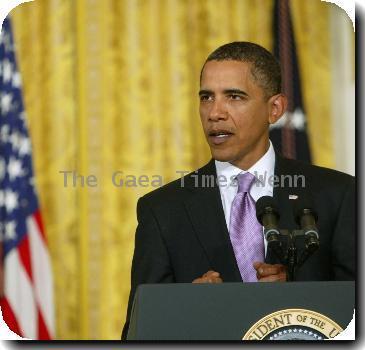US intel, military officials say Iran could have a nuclear bomb in a year, longer for missile
By By Anne Gearan, APWednesday, April 14, 2010
US officials: Iran could be a year away from bomb
WASHINGTON — Iran could amass enough nuclear material to build a bomb in about a year and with help might eventually be able to field a missile powerful enough to reach the United States, senior military and intelligence officials said Wednesday.
Four top representatives of the Obama administration told Congress they are pursuing new sanctions on Iran urgently and add that a military strike has not been ruled out.
President Barack Obama has said he won’t “take any options off the table with respect to Iran,” Undersecretary of Defense Michele Flournoy said. “Now, that means to me that military options remain on the table.”
Iran is pursuing an aggressive missile program, including intercontinental missiles it would need outside expertise to perfect, Defense Intelligence Agency director Lt. Gen. Ronald Burgess told the Senate Armed Services Committee.
That is not the same thing as saying that Iran is closing in on the means to launch a nuclear attack on the United States, but the comments were among the Obama administration’s most precise public assessments of Iran’s military abilities and intentions.
Once Iran decided to build one bomb, it could amass enough highly enriched uranium to do so in as little as 12 months, said Gen. James Cartwright, the vice chairman of the Joint Chiefs of Staff. But he added that Tehran would still need additional time to test the weapon and make it usable against an enemy.
New nuclear nations generally need three to five additional years to make a usable weapon, Cartwright said, but the timeline could be shortened if Iran pursued a warhead and a missile or other delivery system at the same time.
Iran has spurned Obama’s attempts at diplomatic outreach, said Undersecretary of State William Burns.
“Iran’s reckless intransigence has left us no choice but to employ a second tool of diplomacy — economic and political pressure,” Burns said.
The United States is leading a drive for more international economic sanctions on Iran in an effort to deter it from choosing the weapons path. The idea is to persuade an economically strapped Iran that going nuclear isn’t worth the loss of friends, trading partners and international standing.
Burns predicted a sanctions resolution will emerge from the U.N. Security Council within weeks, and that one-time holdout China will go along. But the U.S. wants tougher penalties than some other veto-holding members of the council, and Burns would not say how tough he expects the resolution to be.
Defense Secretary Robert Gates, traveling in Peru, said he thinks there is progress toward a U.N. resolution that would both isolate Iran and serve as “a launching pad for more specific sanctions by individual countries.”
Sen. John McCain, R-Ariz., complained that the U.S. has been a paper tiger, threatening Iran but never fully confronting it.
“We keep pointing the gun. We haven’t pulled a single trigger yet, and it’s about time that we did,” McCain said.
Opinions vary on how much damage a U.S. or Israeli military strike could do to Iran’s nuclear program, which is intentionally opaque and spread among multiple facilities.
U.S. officials generally say that a strike on one or more known facilities would set the program back a few years but not stop it.
The U.S. has also acknowledged that once a nation has sufficient nuclear scientific and technological prowess, it could rebound from nearly any assault on the facilities used for bomb development.
Officials would not publicly address whether the U.S. has changed its nearly 4-year-old assessment that Iran isn’t actively seeking a bomb. The U.S. government is preparing a new classified assessment of Iranian nuclear ability and intent.
The document is likely to conclude that Iran is at least three years from having a fully usable bomb, which includes the time needed to test a weapon and attach it to a missile or other means to deliver it.
U.S. officials, speaking on condition of anonymity because the findings are classified, said recent moves by Iran suggest a more active pursuit of weapons technology.
But the officials cautioned that the intelligence assessment may not conclude that Iran is now on a full drive for the bomb.
Iran claims that its accelerated nuclear program is aimed only as producing energy, not weapons.
Iran’s nuclear chief said Wednesday his country has produced 5 kilograms of 20 percent enriched uranium for a medical research reactor, a move in open defiance of the U.N. demands to halt the suspect program.
The level of enrichment is well shy of the 80 or 90 percent pure uranium needed to build a nuclear weapon.
Associated Press writer Anne Flaherty, traveling with Gates, contributed to this report.
Tags: Barack Obama, Congress, Foreign Policy, Iran, Middle East, North America, United States, Washington, Weapons Administration

